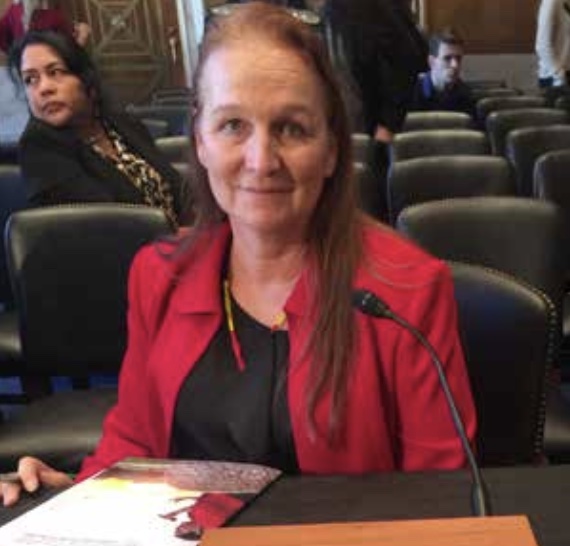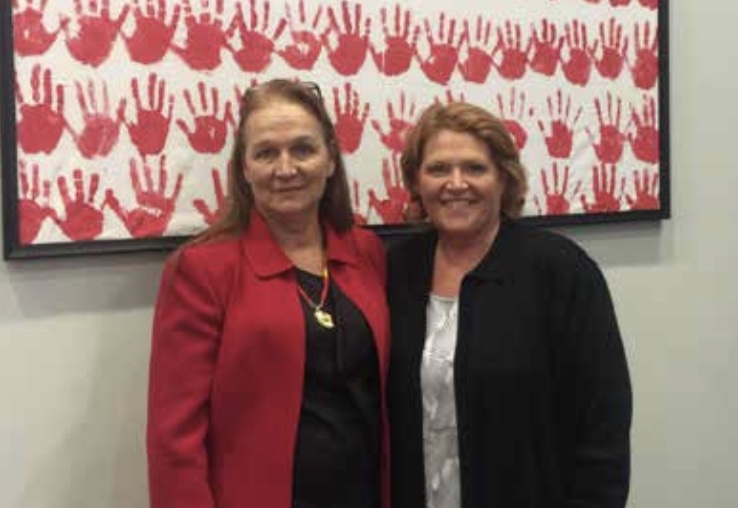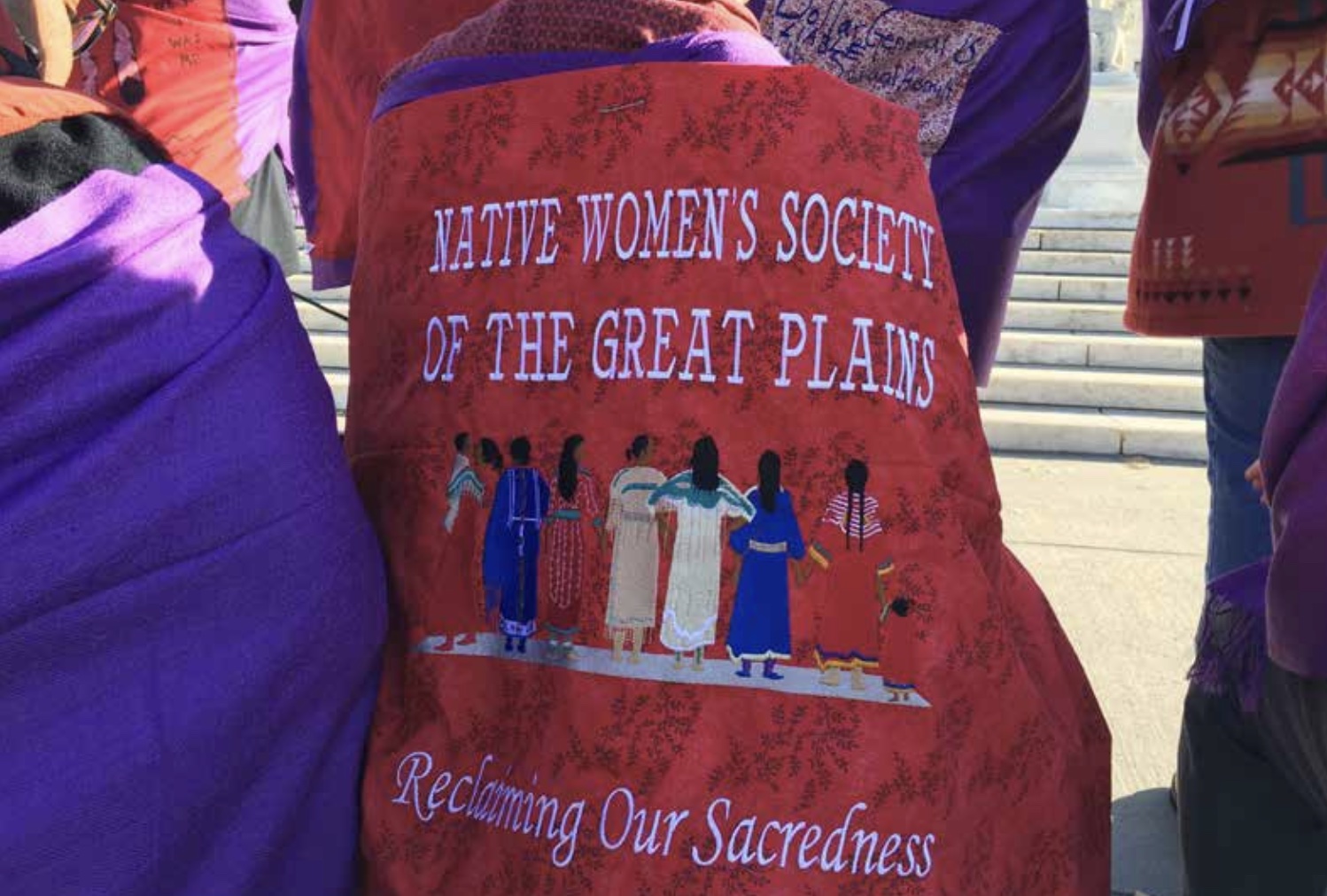Senate Committee on Indian Affairs Holds Hearing to Review Urgent Legislation
 The everyday injustices committed again Native women have focused the Senate Committee on Indian Affairs (SCIA) on addressing this crisis facing Indian nations. On October 25, 2017, the SCIA held a legislative hearing to receive testimony on three bills intended to assist Indian tribes in responding to these injustices. The bills SCIA received testimony on included the SURVIVE Act (S. 1870), the Savanna’s Act (S. 1942), and the Reauthorization of the Tribal Law and Order Act of 2010 (S. 1953). Carmen O’Leary, the Executive Director of the Native Women’s Society of the Great Plains, provided the following testimony addressing the urgent need to address the crisis of violence against Native women.
The everyday injustices committed again Native women have focused the Senate Committee on Indian Affairs (SCIA) on addressing this crisis facing Indian nations. On October 25, 2017, the SCIA held a legislative hearing to receive testimony on three bills intended to assist Indian tribes in responding to these injustices. The bills SCIA received testimony on included the SURVIVE Act (S. 1870), the Savanna’s Act (S. 1942), and the Reauthorization of the Tribal Law and Order Act of 2010 (S. 1953). Carmen O’Leary, the Executive Director of the Native Women’s Society of the Great Plains, provided the following testimony addressing the urgent need to address the crisis of violence against Native women.
Good Afternoon Senators. On behalf of the Native Women’s Society of the Great Plains I would like to thank you for the invitation to present testimony on these important Senate bills. First I want to say each bill is of extreme importance to the everyday safety of Native women and the ability of Indian tribes to protect women. These Senate bills remove certain barriers and increase the ability of Indian tribes to respond to these crimes and provide new options for Federal law enforcement agencies to respond to violence against Native women. Given the time restrictions of today’s hearing I will limit my comments to certain key provision.
I do want to begin however saying that the crisis we face in the levels of violence committed against Native women is well documented. In 2016, the National Institute of Justice (NIJ) published a report that again highlights that more than 4 in 5 American Indian and Alaska Native women (84.3%) have experienced violence in their lifetime. The violence committed against these women included sexual and physical violence, stalking, and psychological abuse. The NIJ reports:
- 56.1% experienced sexual violence
- 55.5% experienced physical violence by an intimate partner
- 48.4% experienced stalking, and
- 66.4% experienced psychological aggression by an intimate partner
The SURVIVE Act (S. 1870) Securing Urgent Resources Vital to Indian Victim Empowerment Act
For over 10 years, the National Congress of American Indians Task Force, advocates, and tribal leaders have requested the creation of a permanent dedicated funding stream under the Victims of Crime Act. The concerns of the NCAI Task Force are based on the following information from the United States Department of Justice:
- Between the years of 2011-2014, programs that served American Indians/Alaska Native survivors of violent crimes received less than 0.5% of the CVF annually.
- In 2013, more than 60% of states with Indian tribes did not make a single sub grant. As a result, Native communities and survivors of violent crimes received little assistance.
With the high rates of violence against Native women Indian tribes and tribal programs need the necessary resources to provide basic services such as safe shelter, rape crisis services, and advocacy for Native women who on many tribal reservations have no services. In addition, Native women need immediate and long-term counseling and medical services due to the multiple victimizations committed against them by a single or multiple abusers. And sadly for those families traumatized by having a missing or murdered relative they often need assistance with transporting their loved one home and with burial. It is a travesty of justice that Indian tribes with the highest rates of victimization do not have direct access, a dedicated tribal funding stream, under the Victims of Crime Act. Senate Bill 1870 will address this longstanding injustice by directing that 5% of the total annual outlays from the Crime Victims Fund (CVF) be provided to Indian tribes.

The Savanna’s Act (S. 1942)
To organize and respond to an injustice, it must first be acknowledged and understood. The Native Women’s Society of the Great Plains has worked for the last 5 years to increase awareness of this issue. We have supported community justice walks, have a Facebook page dedicated to missing and murdered Native women, and honor Native women who have been murdered by creation of miniature traditional dresses. There are so many women who have gone missing or have been murdered it is truly a crisis facing Indian tribes.
“There is a great need to review, revise, and develop protocols on missing and murdered Native women.”
In October of 2016, the National Congress of American Indians (NCAI) passed a resolution to address the crisis of missing and murdered Native women and girls urging the federal government, with agencies including but not limited to the Departments of Justice, Interior, and Health and Human Services, to take action including:
- To review, revise, and create law enforcement and justice protocols appropriate to the disappearance of Native women and girls, including inter-jurisdictional issues;
- To provide increased victim services to the families and community members of the disappeared or murdered Native woman such as counseling for the children of the disappeared, burial assistance, and community walks and healing ceremonies;
- Coordination of efforts across federal departments to increase the response to the disappearance or murder of Native women and girls; and
- Coordinate efforts in consultation with Indian tribes’ efforts to increase the response of state governments, where appropriate, to cases of disappearance or murder of Native women or girls.
These were fundamental steps toward responding to the crisis we face on a daily basis in lost lives. S. 1942 addresses necessary steps in responding to the crisis we face as Native women continue to go missing and are murdered. This year the Senate passed a resolution declaring May 5, 2017, as a National Day of Awareness for Missing and Murdered Native Women and Girls. I thank you for your support for the National Day of Awareness and can say the first national day of awareness reached millions of people across the United States and the world through social media platforms.

“Social media impressions related to the National Day of Awareness for Missing and Murdered Native Women and Girls numbered approximately 8.5 million.”
This public call for increased awareness is indicative of the extent of the reality that Native women go missing on a daily basis often without any response by law enforcement. I support the changes S. 1942 will make and would also like to suggest inclusion of field hearings on missing and murdered Native women to allow tribal communities the opportunity to share their losses and recommendations of how to improve the justice response to these cases.
Reauthorization of the Tribal Law Order Act of 2010 (S. 1953)
The Tribal Law and Order Act (TLOA) was an historic bill we as advocates celebrated because we recognized the need to create law enforcement reform for American Indian tribes. The most significant change being restoring the authority of Indian tribes to sentence offenders for more than a maximum of one year per crime. TLOA also has many other important provisions and I would like to address several.
Federal Accountability. Section 201 of the TLOA requires U.S. Attorneys to coordinate with tribal justice officials on the use of evidence when declining to prosecute or refer a reservation crime. Sharing of this type of information is critical to keeping Indian women safe. Tribal officials need to be notified when a U.S. Attorney declines to prosecute sexual assault and domestic violence cases so that, in the case of an Indian defendant, a tribal prosecution may proceed, or in all other cases, tribes can at least notify the victim of the status of the case so that the victim may take the necessary steps for protection. I recommend U.S. Attorneys do more to increase coordination and reporting duties with tribal justice officials under the TLOA.
Enhanced Tribal Sentencing Authority. Section 304 of the TLOA grants tribal courts the ability to sentence offenders for up to 3 years’ imprisonment for any one offense under tribal criminal law if certain protections are provided. This is a significant improvement, although this maximum sentence still falls short of the average sentence of 4 years for rape in other jurisdictions. Indian tribes must have the capacity to house the offender in detention facilities that meet federal standards; otherwise, the enhanced sentencing power is meaningless. It is very important the Bureau of Prisons Pilot Project is reauthorized.
Prisoner Release and Reentry. Section 601 of the TLOA requires the U.S. Bureau of Prisons to notify tribal justice officials when a sex offender is released from federal custody into Indian country. It is absolutely essential that tribal justice officials are notified of prisoner release and reentry on Indian lands, regardless of the process by which this occurs. Proper implementation of this provision is critical to the safety of Indian women.
These are just some of the provisions within the TLOA that will help protect the safety of Native women. Again, I thank you for the opportunity to testify on these important Senate Bills.
Carmen O’Leary
Executive Director
Native Women Society of the Great Plains
Savanna’s Act (S. 1942) Summary
On October 5, 2017, Senator Heidi Heitkamp (D-ND) introduced Savanna’s Act, which would address the number of missing and murdered American Indian and Alaska Native women in the United States.
Heitkamp introduced the bill after Savanna LaFontaine-Greywind was found tragically murdered and her new born baby found in the possession of her killers.
The bill would improve tribal access to federal crime information databases, such as NCIC, and would create data fields relevant to the Native population. The bill also calls on law enforcement agencies to create standardized protocols across jurisdictions to address the issue of missing and murdered and requires an annual report to Congress.
The bill has bipartisan support in the Senate Committee on Indian Affairs, and as of the date of this update, nine cosponsors. Additionally, there is an identical companion bill in the House (H.R. 4485), introduced by Rep. Norma Torres (D-CA- 35). As of January 9, 2018, H.R.4485 was referred to the Subcommittee on Crime, Terrorism, Homeland Security, and Investigations.





